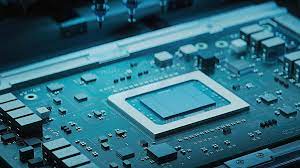Loading
Search
▼ Us-China Chip War: Japan Plans To Restrict Some Equipment Exports
- Category:Other
Japan's government says it plans to put restrictions on some computer chip-making exports, following similar moves by the US and the Netherlands.
The measures will apply to 23 types of semiconductor manufacturing equipment.
Semiconductors, which power everything from mobile phones to military hardware, are at the centre of a bitter dispute between the US and China.
China has frequently called the US a "tech hegemony" in response to export controls imposed by Washington.
However, Friday's statement from Japan's trade and industry ministry did not make any reference to China or the US.
"We are fulfilling our responsibility as a technological nation to contribute to international peace and stability," the ministry said.
The policy will be subject to public comment, with plans to implement it in July.
Japanese trade minister Yasutoshi Nishimura told reporters that the move was not coordinated with US restrictions.
"If our exports are not being reappropriated for military use, we will continue exporting. We believe the impact on companies will be limited," Mr Nishimura added.
The announcement came as Japanese foreign minister Yoshimasa Hayashi was due to visit Beijing at the weekend.
Mr Hayashi said he will meet his Chinese counterpart Qin Gang for "an honest and frank discussion to create a constructive and stable relationship".
Japan's restrictions will apply to equipment supplied by major technology companies including Tokyo Electron and Nikon.
They will affect exports ranging from tools which are used to clean silicon wafers to immersion lithography machines.
Lithography machines use lasers to print miniscule patterns on silicon as part of the manufacturing process of microchips.
In October, Washington announced that it would require licences for companies exporting chips to China using US tools or software, no matter where they are made in the world.
The US had also called on the Netherlands and Japan to adopt similar restrictions.
This month, the Dutch government said it would put restrictions on the country's "most advanced" microchip technology exports to protect national security.
Dutch trade minister Liesje Schreinemacher said the measures will affect "very specific technologies in the semiconductor production cycle".
She added that the government had considered "the technological developments and geopolitical context," without naming China or Dutch chip equipment maker ASML.
ASML is one of the most important firms in the global microchip supply chain. It makes machines that produce the world's most advanced chips.
The measures will apply to 23 types of semiconductor manufacturing equipment.
Semiconductors, which power everything from mobile phones to military hardware, are at the centre of a bitter dispute between the US and China.
China has frequently called the US a "tech hegemony" in response to export controls imposed by Washington.
However, Friday's statement from Japan's trade and industry ministry did not make any reference to China or the US.
"We are fulfilling our responsibility as a technological nation to contribute to international peace and stability," the ministry said.
The policy will be subject to public comment, with plans to implement it in July.
Japanese trade minister Yasutoshi Nishimura told reporters that the move was not coordinated with US restrictions.
"If our exports are not being reappropriated for military use, we will continue exporting. We believe the impact on companies will be limited," Mr Nishimura added.
The announcement came as Japanese foreign minister Yoshimasa Hayashi was due to visit Beijing at the weekend.
Mr Hayashi said he will meet his Chinese counterpart Qin Gang for "an honest and frank discussion to create a constructive and stable relationship".
Japan's restrictions will apply to equipment supplied by major technology companies including Tokyo Electron and Nikon.
They will affect exports ranging from tools which are used to clean silicon wafers to immersion lithography machines.
Lithography machines use lasers to print miniscule patterns on silicon as part of the manufacturing process of microchips.
In October, Washington announced that it would require licences for companies exporting chips to China using US tools or software, no matter where they are made in the world.
The US had also called on the Netherlands and Japan to adopt similar restrictions.
This month, the Dutch government said it would put restrictions on the country's "most advanced" microchip technology exports to protect national security.
Dutch trade minister Liesje Schreinemacher said the measures will affect "very specific technologies in the semiconductor production cycle".
She added that the government had considered "the technological developments and geopolitical context," without naming China or Dutch chip equipment maker ASML.
ASML is one of the most important firms in the global microchip supply chain. It makes machines that produce the world's most advanced chips.
- March 31, 2023
- Comment (0)
- Trackback(0)


